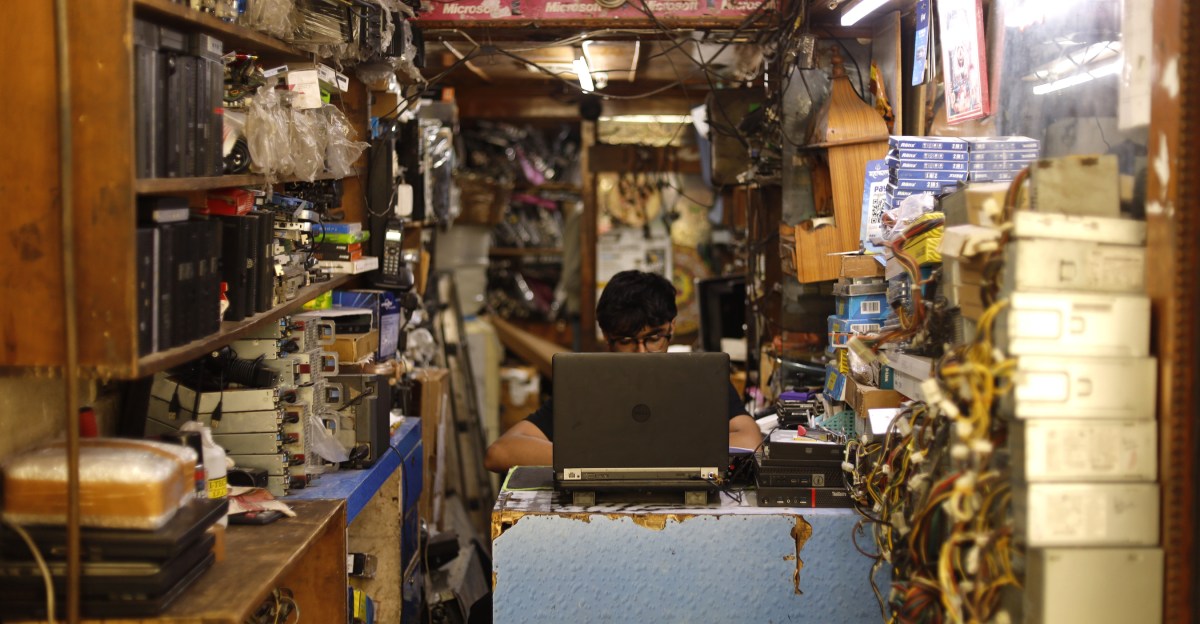
The Rise of 'Frankenstein' Laptops in New Delhi's Repair Markets.
Technicians in refurbished laptop stores in India rehabilitate discarded electronic devices, giving them a new lease on life.
In a cluttered and dimly lit workshop in Nehru Place, Delhi, the sound of drills and welders fills the air. Sushil Prasad, a 35-year-old technician, wipes the sweat from his brow as he meticulously works on an old laptop. This is a daily ritual for him, where he salvages machines by assembling motherboards, screens, and batteries obtained from discarded devices, thus creating functional and low-cost equipment.
Prasad notes that there is currently a high demand for "hybrid" laptops. Most users do not care about having the latest model; they simply look for a device that works and doesn't cost them a fortune. In metropolises across India, from Nehru Place in Delhi to Lamington Road in Mumbai, technicians like Prasad reuse old computers that many consider trash. These devices, often built from parts of different brands, are sold to students, gig workers, and small businesses, providing a viable option for those who have been excluded from the country's growing digital market.
"We take useful components from different old or discarded systems to create a new unit," explains Prasad, who mentions that they use a variety of salvaged parts, such as capacitors and transistors, in the refurbished laptops. As he shares this, Manohar Singh, the workshop owner, opens a restored laptop, and the screen gleams with a sharp image. His smile indicates that he has successfully revived another machine.
Singh mentions that some students have come to his shop urgently seeking a laptop for their studies. He recalls one particular case where he helped a young engineering student who had been saving for months but still did not have enough money. "I built him a machine from spare parts, and he left with tears in his eyes. That's when you realize this work is important," he adds.
However, the growth of this market does not happen in a vacuum. It is entangled in a broader struggle between small repairers and large tech companies. Even though these Frankenstein laptops represent a solution for many, the repair sector faces significant obstacles. Major brands often complicate repairs by restricting access to spare parts and using screws and software locks that force consumers to buy new devices.
Satish Sinha, associate director of a nonprofit focused on waste management, states that technicians like Prasad and Singh are on the front line of a larger battle. "India has always had a repair culture, from old radios to second-hand phones. But companies are promoting planned obsolescence, complicating repairs and forcing people to acquire new devices," Sinha points out.
The Indian government has begun discussing right-to-repair laws, inspired by similar initiatives in the European Union and the United States. However, progress is slow, and many repair shops operate in a sort of legal limbo. This leads technicians to rely on informal supply chains, with Seelampur, a major e-waste hub, being crucial for obtaining spare parts. With approximately 30,000 tons of e-waste processed daily, this market provides employment to thousands of informal workers who extract valuable materials.
Farooq Ahmed, an 18-year-old trader, has been collecting components for technicians for years. He states that they find functional parts that would otherwise end up in a landfill. However, collecting e-waste also comes with risks, as workers are exposed to toxic materials without proper safety measures. Despite these dangers, the demand for these systems continues to rise.
With the expansion of the digital economy in India, the need for affordable technology will continue to grow. Many believe that integrating the repair sector into the formal economy can bring benefits, reducing e-waste, generating jobs, and making technology more accessible. Although the future looks promising, technicians in dark workshops continue to work hard to revive devices and bridge the digital divide in the country.



